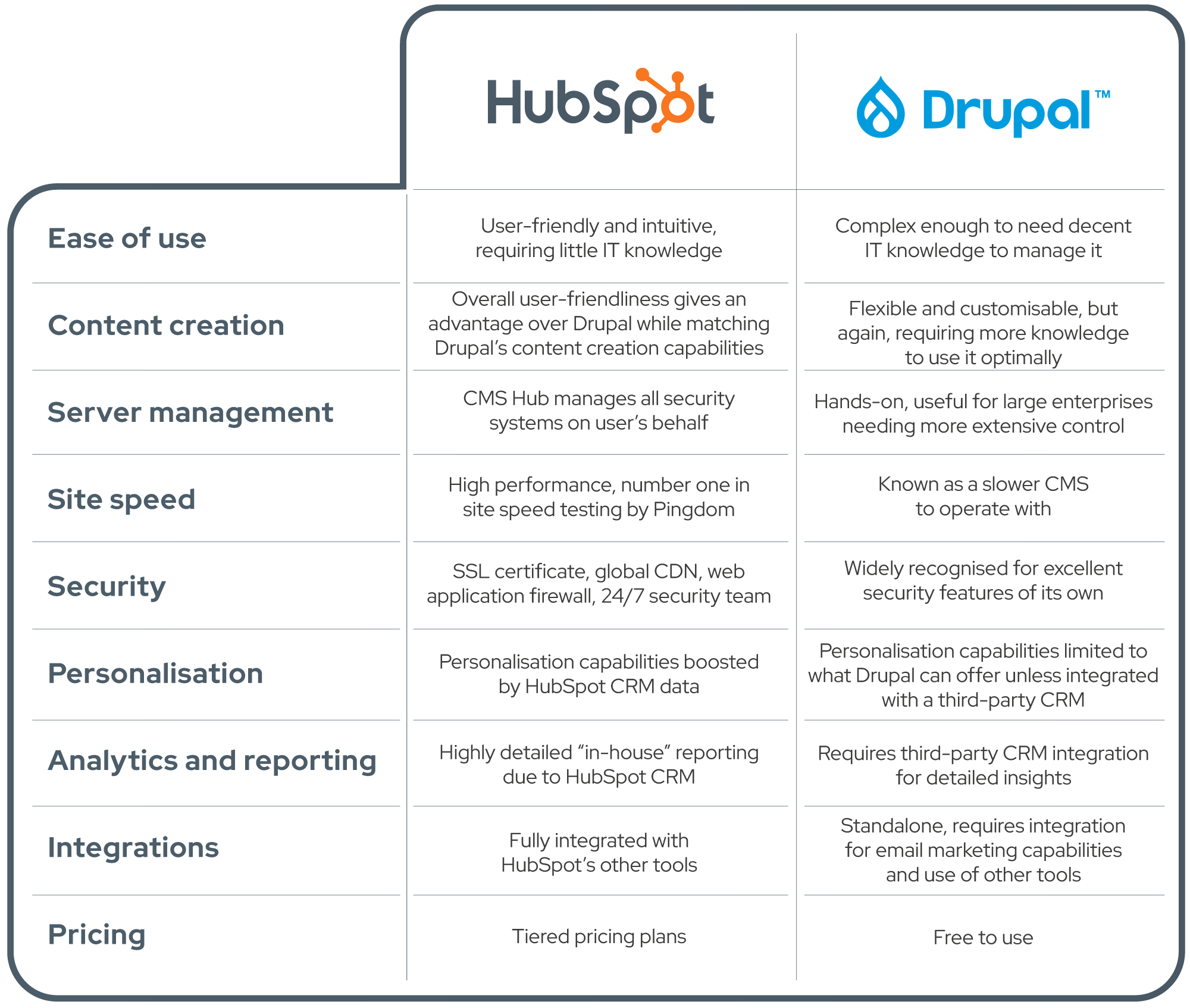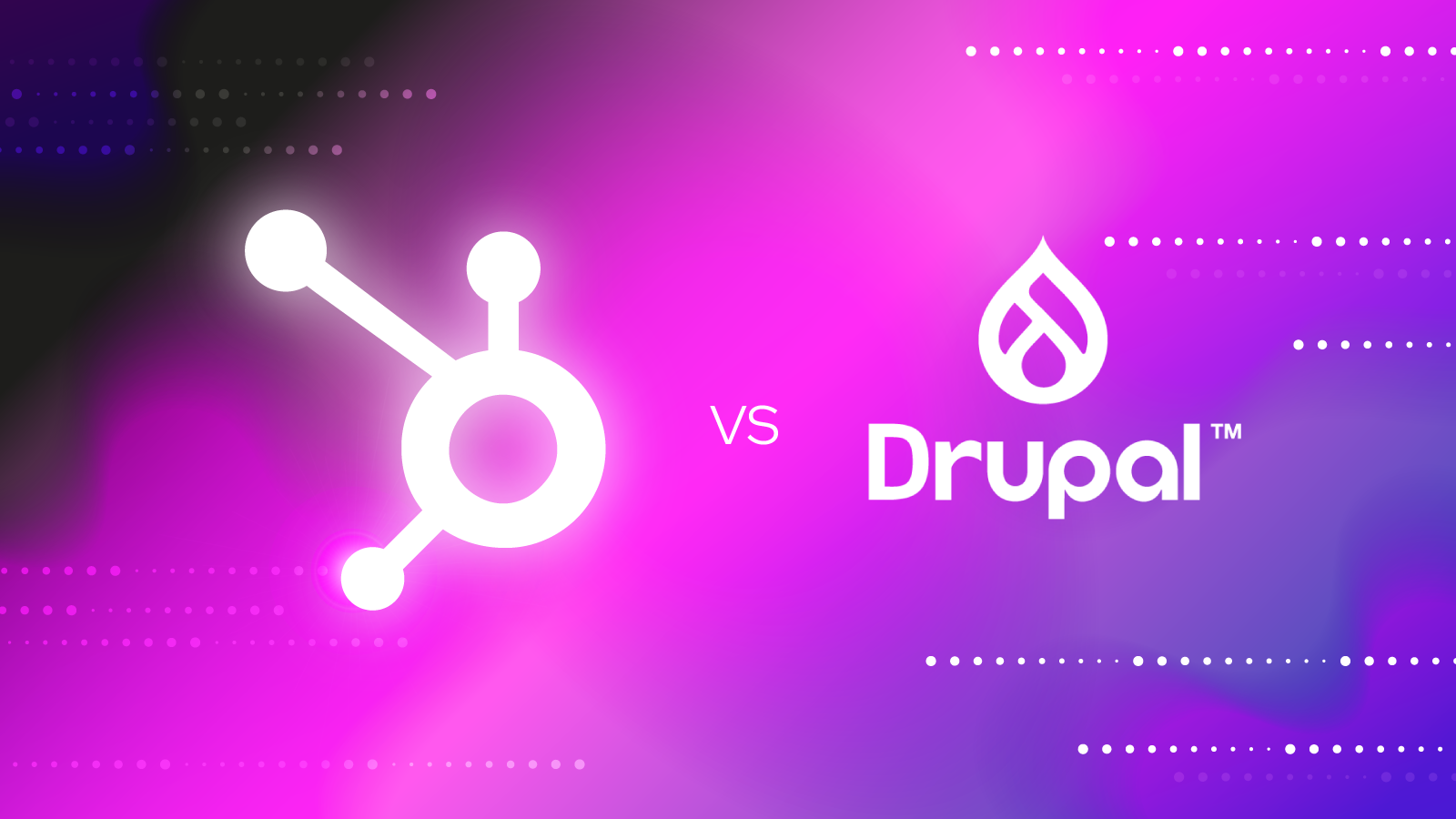Managing and self-hosting your website might seem like a task better left to the IT professionals, but that’s not the case in today’s digital arena. We are spoiled for choice when it comes to platforms that help us do it ourselves!
The question is, how do we choose the right one for our business requirements? Both HubSpot CMS and Drupal offer CMS solutions that allow businesses to host and manage their websites, but the features they offer differ greatly. Let’s take a look at both platforms and see how they shape up against each other.
Here are some quick facts about CMS:
- Over 73 million websites online utilise a CMS. (Meetanshi, 2023)
- CMS’s global market value is expected to reach $123.5 billion USD by 2026. (Meetanshi, 2023)
- The percentage of websites not using a CMS is declining; websites are transitioning to CMS platforms at a growing number. (Meetanshi, 2023)
What are HubSpot and HubSpot CMS?
HubSpot is a platform that provides a range of marketing, sales, and customer service tools for businesses through various features, such as marketing automation, CRM system capabilities, email marketing, social media management, and analytics.
The software’s CMS (content management system) platform allows businesses to create and manage their website content. HubSpot offers a range of features and tools to assist you in running your site and managing your pages, blog posts, landing pages, forms, etc. These features include drag-and-drop page editing, flexible page templates, responsive design, SEO tools, and integrated analytics. The CMS also includes several marketing automation features; email marketing, social media publishing and lead tracking make the CMS Hub an all-in-one platform for managing your website's content and marketing.
HubSpot’s CMS features include:
- Drag-and-drop website building
- Responsive design suited for all devices
- SEO optimisation tools
- Content creation and management tools
- Multi-language capabilities
- Personalisation and customisation
- A/B testing
- Full integration with other HubSpot tools
- Advanced security features, SSL certificates, and automated malware scanning
HubSpot in general has won numerous awards, and also receives great reviews regularly. Both are a solid indicator of the platforms capabilities and market prowess. HubSpot was selected as the #1 Global Software Company at G2’s 2023 Best Software Awards, and winner of the Gartner Peer Customer Choice Awards 2022.
Furthermore, a G2 reviewer wrote that the “CMS Hub is a powerful and user-friendly content management system that allows businesses to easily create, manage, and optimize their digital content. One of the best things about it is its integration with other HubSpot tools, such as marketing, sales, and customer service, which allows for a seamless and efficient workflow. Additionally, its drag-and-drop website builder and customizable templates make it easy for users with little to no web development experience to create professional-looking websites.”
With such a comprehensive list of features, numerous awards, and great reviews, it’s easy to see why HubSpot is the platform of choice for many marketers!
What is Drupal?
Drupal is a free, open-source CMS used to create and manage websites. The platform is widely recognised for its flexibility, scalability, security, and customisation. Offering a comprehensive range of features and capabilities that include content creation and publishing, user management, SEO, and e-commerce capabilities, Drupal can be utilised by businesses of all sizes.
Drupal has received many great reviews too. One G2 reviewer wrote that “One of Drupal's best features is its adaptability and scalability. Any website or web application can be tailored to match the particular requirements of Drupal thanks to its modular architecture and large library of modules and themes.
Drupal offers a robust and flexible platform for creating and managing websites, from straightforward blogs and portfolios to intricate e-commerce sites and social networks.
Drupal's active developer and user community is yet another outstanding quality. Together with continuously adding new modules and features, the community also offers users assistance and resources.”
Drupal’s features include:
- Customisable themes
- Multilingual support
- Robust user permissions
- Scalability, websites can be scaled both up and down
- SEO
- Security capabilities
- Content versioning, making it easier to roll back to earlier versions of content
- E-commerce integration
While both platforms have many features, there’s no mistaking that drawbacks are part of the deal too. Let’s take a look at what HubSpot and Drupal offer in some crucial areas, including:
- Ease of use
- Content creation
- Server management
- Site speed
- Security
- Personalisation
- Reporting and analytics
- Integrated marketing tools
Ease of use
HubSpot is generally recognised for its user-friendliness across all services, and this applies to its CMS Hub as well. The CMS utilises drag-and-drop functionality, allowing users to create content and customise their websites easily, without the need for in-depth knowledge of coding or web development.
Drupal, on the other hand, is far better utilised in the hands of IT professionals and developers. Learning how to navigate the platform and use the platform to its full potential requires a level of tech savviness that HubSpot doesn’t. For websites that are complex and require intensive development, Drupal is a better choice. However, users may find it will be difficult to execute a Drupal site unless they are willing to hire a developer to assist them.
Content creation
When it comes to content creation, Drupal does have a flexible range of custom content types. But, again, although it may be functional, people generally find that it is not the most user-friendly content creation experience. Looking past that, Drupal has several useful content creation features, such as taxonomy for categorising and tagging content, which helps with visitor search and general SEO, as well as a media library and multi-version revision and drafting.
HubSpot is widely recognised for its overall user-friendliness, and creating content in the CMS Hub is no different. Drag-and-drop editing makes it easy to create web and landing pages without the need for any coding knowledge, and the variety of customisable templates makes it easier to capture and present your content as you envision it. The CMS Hub is also optimised for SEO. Additionally, Hub CMS offers a smart content feature. This allows you to create smart content that changes based on the visitor's location, device, and lifecycle stage. Your content can also be personalised in a general sense based on the visitor's behavior, interests, and demographic information.
Server management
CMS Hub manages all administrative and maintenance work on your behalf, meaning you don’t need to worry about platform updates and server maintenance. Additionally, security, backups, and uptime are all managed by HubSpot. It is important to note that this means you do not have access to server-side code, and therefore have less control over your site than you would have with Drupal. If that is not a significant concern then HubSpot’s ease of use is a worthy trade-off. Ultimately, HubSpot taking care of these details means reduced manpower and hours, and increased revenue as a result.
With Drupal, server management is far more hands-on than HubSpot. As mentioned, Drupal requires a level of technical expertise to be run effectively. The platform has robust server management capabilities, but it is more suited to building websites and applications that require a high level of control and customisation over the underlying infrastructure.
Site speed
Website pages load quickly with the CMS Hub thanks to automatic image compression, minified JS, and combined CSS files. On the other hand, Drupal can be a slow CMS to operate with. In fact, a site speed study by Pingdom found that HubSpot CMS outperformed Drupal in page load time!
Security
CMS Hub comes with SSL, making your site extremely secure and also increasing your Google ranking. HubSpot provides security features to all sites regardless of size or traffic. CMS boasts a global CDN, SSL certificate support, and a web application firewall. In addition to this, HubSpot also provides a 24/7 site security team.
On the other hand, Drupal is recognised for tight security features of its own. However, it is important to consider your business’s needs. Given the technicality of Drupal, and the fact that HubSpot has world-class security features and far greater ease of use, CMS Hub still positions itself as the better option for most users’ requirements.
Personalisation
Thanks to HubSpot CRM’s integration CMS Hub, you are able to create highly personalised content based on customer and lead data you’ve gathered via your website. The smart content feature also creates a personalised experience for each site visitor, as content can be adjusted without a developer’s input, based on device type, referral source, contact list membership, and a number of other criteria.
Drupal also offers personalisation capabilities, including built-in content personalisation tools that allow you to tailor content based on user preferences, behaviour, and location. However, to gain more granular insight into customer and lead activity, a CRM must be integrated with the platform.
Reporting and analytics
Another major advantage to HubSpot, in general, are its capabilities as a “one-stop-shop.” This means CMS Hub requires no integrations in order to produce analytics. Drupal requires integration with third-party analytics tools such as Google Analytics in order to track site visitor behaviour and provide insights on site usage patterns. One benefit to Drupal’s flexibility is that users can create custom analytics tracking. This is done using the Drupal module, or other tools like Webform and Views.
CMS Hub has a robust range of analytics features, including web analytics that provides insight into how your content is performing, and contact attribution that reports what pieces of content your leads are engaging with. Other CMS Hub features include monitoring of website traffic, conversion tracking using form submissions, CTA clicks and purchases, A/B testing capabilities to compare pages for performance, as well as analytics on any personalisation and customisation a user may have made to their site.
Integrated marketing tools
The key difference between marketing tool integration in CMS Hub and Drupal is that CMS Hub is, of course, a part of HubSpot. And HubSpot itself provides a fully integrated platform of tools. Drupal, on the other hand, is standalone and requires integration with other platforms and tools. Users will have to integrate Drupal with other services to use it in conjunction with email marketing, as well as analytics reporting, as mentioned.
Through HubSpot, CMS Hub provides the following already-integrated functions:
- Email marketing workflows
- Social media publishing and scheduling
- Lead capture forms
- SEO tools
- Analytics, insights, and reporting dashboards
- CRM (customer relationship management) systems
Pricing
For pure CMS management, Drupal becomes really attractive when you learn it is free to use. This may clinch the deal for many people, but the key thing is to weigh up what HubSpot provides against what Drupal does not, the details of which we have discussed throughout this article.

Conclusion
HubSpot CMS and Drupal are both popular content management systems (CMS) used by businesses and organisations to build and manage websites and while both platforms offer similar features, they have some key differences.
HubSpot CMS offers a user-friendly interface, intuitive drag-and-drop editing tools, and a range of marketing and automation features. Overall, it is a good choice for businesses focused on inbound marketing and lead generation and can utilise its SEO optimisation, analytics, and personalization tools.
Drupal, on the other hand, does provide a high degree of flexibility and customization, but at the cost of user-friendliness. It has robust capabilities for managing large and complex websites that require and have the resources or prioritise developer input and management.
Get in touch with us today and find out more about how HubSpot can help you.


